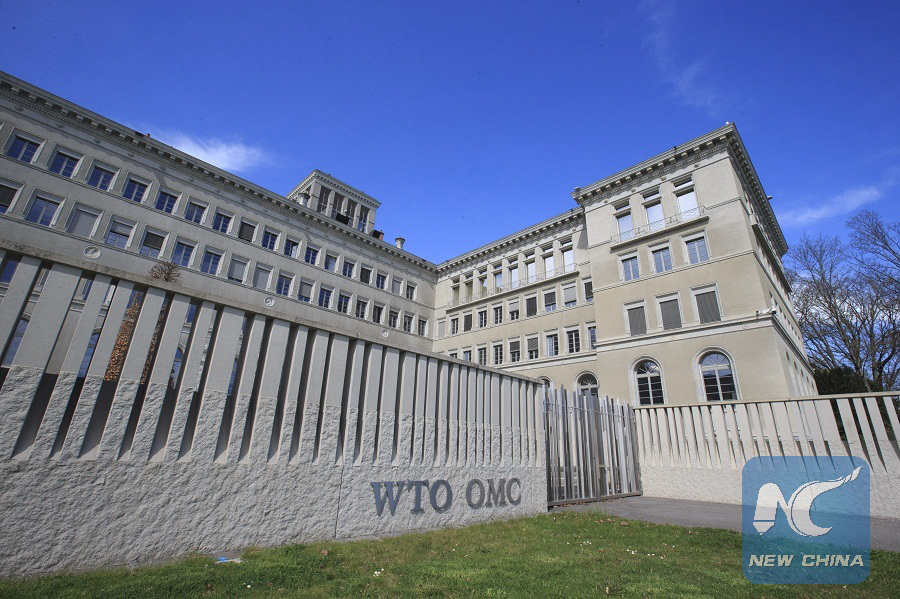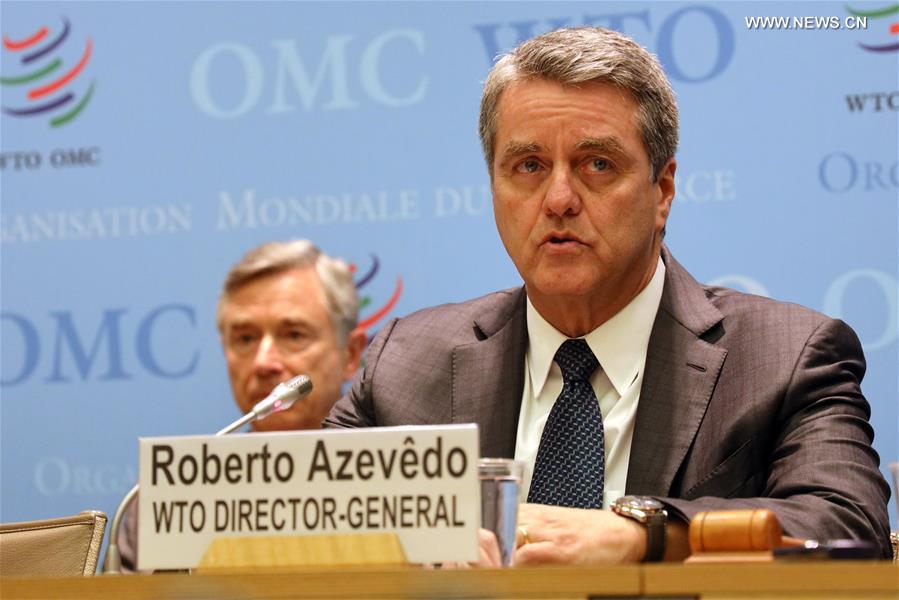
Photo taken on April 12, 2018 shows the World Trade Organization headquarters in Geneva, Switzerland. (Photos: Xinhua)
Instead of resorting to the World Trade Organization (WTO) for fair resolution of disputes, global trade is now facing what critics call “the law of the jungle” as the U.S. successfully sabotaged the WTO appeals court, with two of its final three judges expiring on Dec. 10.
The panel, which is supposed to have seven judges, witnessed the number dwindling down to three, the minimum requirement for the hearing of each appeal, as the United States, under Presidents George W. Bush, Barack Obama and Donald Trump, has blocked new appointments to show its discontent over the WTO’s ruling.
“The departure of the two judges is a coup de grâce for the WTO, as its ability to issue rulings is now officially deprived,” said Tu Xinquan, President of the China Institute for WTO Studies at the University of International Business and Economics, who further noted that under Trump, an exceptionally vociferous critic of the WTO, the US is now determined to secure its own interests at the expense of current global economic order.
According to WTO statistics, among the pending disputes, seven have been brought against Trump’s decision in 2018 to hit foreign steel and aluminum with import taxes. Experts noted that without the ruling of the WTO now, the US can now circumscribe imports with tariffs and sanctions, which will cast a shadow on global trade.
“The WTO now faces a serious crisis in the foreseeable future. Its existence may not be hindered, but its function of promoting global trade and settling international disputes will be severely damaged, leading to rising protectionism worldwide,” said Zha Xiaogang, a research fellow at the Shanghai Institute for International Studies.
US as the Oxymoron

World Trade Organization (WTO) Director-General Roberto Azevedo (Front) speaks at a press conference after a two-day meeting of the WTO's General Council in Geneva, Switzerland, on Dec. 10, 2019. Roberto Azevedo said here Tuesday that as of Wednesday, the Appellate Body would be unable to hear new appeals.
“The intentional sabotage of the WTO has showcased the inherent oxymoron seen within the foreign and economic policies of the US. The country has stepped away from being a country abiding by the written rules to a power abusing one in which it utilizes its economic and political clout to get whatever it wants. It can judge other nations, but it doesn’t want to be limited by global rules,” said Tu.
For the US side, it wants more access to foreign markets while setting obstacles for other nations in the regard of what they can export to America. Take China for instance, the US has been trying to bypass the WTO to tackle its issues with China, and has already weaponized tariffs and sanctions.
“The US doesn’t want a multilateral trading system to restrict its unilateralism approach, preferring to brandish tariffs on other nations. The once so-called fair trade advocator has now led to the stagnancy, or even collapse of the current global economic order,” said Zha, who further noted that though the US has been condemning other nations for unfair trade, the example set by itself has left scant ground for rebuke.
The US’ sabotage of the WTO was received with disapproval by most WTO members. Zhang Xiangchen, China’s ambassador to the WTO, attended a WTO meeting last week wearing a black tie for funeral, addressing the shutdown as “no doubt the most severe blow to the multilateral trading system since its establishment,” as well as accusing US of being a wheeler-dealer.
The EU’s WTO ambassador, Joao Aguilar Machado, also said in a statement that the EU “will not support, and will not condone, a system slipping into power-based economic relationships.”
“Economic globalization is an unstoppable trend, even the US cannot deny. For the US it may appear to be a burden, but for most nations, like major economic powers such as China and the EU, or smaller entities, a multilateral mechanism like the WTO is exactly what is needed to tackle trade issues,” said Tu.
Unpredictable future
Technically speaking, the shutdown of the WTO appellate body doesn’t mean the end of having a settler of global disputes. According to WTO statistics, between 1995 and 2018, 573 cases were brought to the WTO (ironically, with US being the No. 1 complainant), while 40 percent of the cases are dealt with through negotiations versus appeals. Only 166 cases were sent to the appellate body for final rulings, accounting for only 30 percent of the total.
Though experts believed that the WTO will continue acting as a crucial organization promoting global trade, they also showed concerns regarding the mechanism’s future development, as interferences stemming from the US are not expected to cease anytime soon.
“The WTO has two major functions. It’s a negotiating organization and a dispute settlement body. Both are now at peril,” said Zha.
Though member states, including the US, have been calling for a reform of the WTO in order to adapt to new economic realities, the prosperity of such an approach is gloomy, as it requires consensus from its 164 members.
According to Zha, the US will return to the WTO table only when its economy is also damaged by unilateralism. Though global trade may dampen the development of some traditional American industries such as manufacturing, other industries including agriculture, services and electronic chips will surly need global trade to boost profits. Once the damage is prominent enough, US may consider accepting a multilateral trade system.
“I think the WTO will continue to exist, though its future development is hard to predict,” said Tu.


